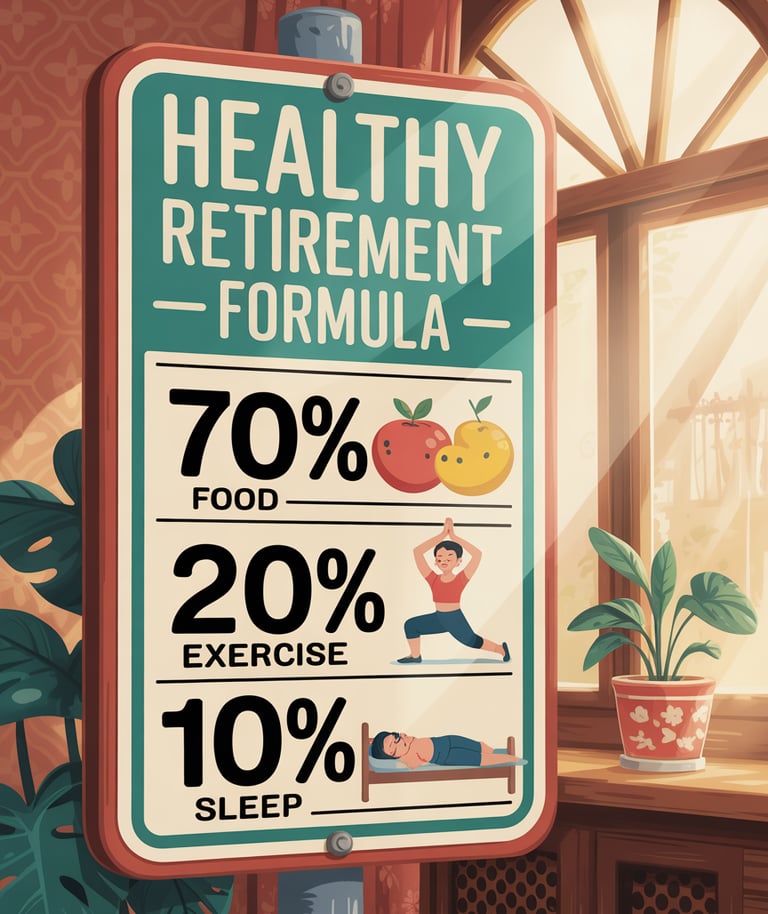Your Plate, Your Power: Why Food is 70% of Your Healthy Living Equation
Ever heard the saying, "You are what you eat"? Well, it turns out that old adage is more profound than a fortune cookie. When we talk about living a truly vibrant, energetic, and long life, many experts agree on a fascinating breakdown: Health is roughly 70% Food, 20% Exercise, and 10% Sleep. That's right, what you put on your plate takes the lion's share of the credit (or blame!) for how you feel, how well you age, and how much pep you have in your step.
Think about it: you might hit the gym like a superhero, and your sleep might be as peaceful as a baby's, but if your diet consists mainly of sugary snacks and processed mystery meats, your body is essentially running on low-grade fuel. It's like trying to win a Formula 1 race with regular unleaded petrol – you just won't get the performance you need! So, let's concentrate on that mighty 70% and why choosing natural, wholesome foods is your ultimate superpower.
The Magic of Natural Food: Back to Basics
What exactly do we mean by "natural food"? Simply put, it's food that's as close to its original state as possible. Think fresh fruits and vegetables pulled straight from the earth, lean meats and fish, whole grains you can actually recognize, and legumes that haven't been processed into oblivion.
Why are these your best friends?
Nutrient Powerhouses: They're packed with vitamins, minerals, antioxidants, and fiber – all the good stuff your body craves to function optimally, fight off disease, and keep you feeling fantastic.
Steady Energy: Unlike sugary, processed foods that give you a quick spike and then a crash (hello, afternoon slump!), natural foods release energy slowly and steadily, keeping you fueled and focused throughout the day.
Fewer Nasties: They're generally free from artificial colors, flavors, preservatives, excessive added sugars, and unhealthy trans fats that can wreak havoc on your system over time. Eating natural means less work for your liver and a happier gut!
The Gold Standard: Why Japanese and Mediterranean Diets Always Get a Shout-Out
When doctors, nutritionists, and longevity experts start talking about ideal eating patterns, two diets consistently rise to the top: the Japanese diet and the Mediterranean diet. They're not "diets" in the restrictive, temporary sense, but rather sustainable, delicious lifestyles.
The Japanese Way: Longevity on a Plate
If you've ever wondered why Japan boasts some of the longest lifespans in the world, look no further than their traditional diet. It's a masterclass in balance and mindfulness:
Fresh Fish & Seafood: A cornerstone, providing abundant omega-3 fatty acids, which are fantastic for heart health and brain function. Think grilled salmon, mackerel, and plenty of sushi (the fresh, simple kind!).
Plenty of Vegetables: Every meal is usually accompanied by a variety of colorful, often lightly cooked or pickled, vegetables. This means a huge intake of vitamins, minerals, and fiber.
Rice as a Staple: White rice is common, but it's often eaten in moderation and balanced with other nutrient-dense foods.
Fermented Foods: Miso soup, natto, and pickled vegetables are daily staples. These are incredible for gut health, boosting your immune system and aiding digestion.
Low in Red Meat, Dairy, and Processed Foods: Traditionally, Japanese cuisine uses very little red meat and dairy, and processed foods are not a significant part of the daily intake.
Mindful Eating & Portion Control: Meals are often served in smaller portions, and there's an emphasis on savoring each bite. It's about eating until you're 80% full, not stuffed.
The Mediterranean Secret: Heart Health and Happiness
Inspired by the eating habits of countries bordering the Mediterranean Sea (like Greece, Italy, and Spain), this diet is celebrated worldwide for its incredible health benefits:
Olive Oil is King: Extra virgin olive oil is the primary source of fat, loaded with healthy monounsaturated fats and antioxidants. It's used for cooking, dressing salads, and even dipping bread.
Abundant Fruits & Vegetables: A rainbow of fresh produce is consumed daily, providing essential vitamins, minerals, and fiber.
Whole Grains & Legumes: Think whole wheat pasta, brown rice, lentils, chickpeas, and beans. These are excellent sources of complex carbohydrates and fiber.
Nuts & Seeds: Healthy fats, protein, and fiber in every handful.
Fish & Poultry (Moderate): Fish is eaten regularly, while poultry is consumed in moderation. Red meat is typically limited to a few times a month.
Dairy (Moderate): Yogurt and cheese are consumed in moderate amounts.
Wine in Moderation (Optional): Often enjoyed with meals, though this is entirely optional and depends on individual preference.
Social Eating: Meals are often a social affair, enjoyed slowly with family and friends, which contributes to mental well-being.
Both the Japanese and Mediterranean diets prioritize whole, unprocessed foods, emphasize plant-based ingredients, and include healthy fats and proteins. They teach us that eating well isn't about strict rules, but about building sustainable habits around real, delicious food.
The Other 30%: Not Forgotten, Just Supported!
While food takes the lead, let's not forget our trusty co-stars: exercise and sleep. Regular physical activity keeps your body strong, your heart healthy, and your mind sharp. And quality sleep is when your body repairs, recharges, and consolidates memories. These two pillars are absolutely vital, but they perform best when fueled by that incredible 70% – good nutrition.
So, next time you're planning a meal, remember the power you hold. Your plate isn't just about satisfying hunger; it's about building a foundation for a long, healthy, and incredibly vibrant retirement. Bon appétit (or Itadakimasu!) to a healthier you!

